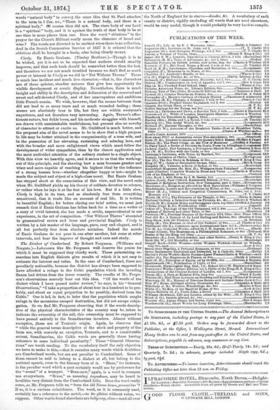Cicely. By Ennis Graham. (Tinsley Brothers.)—Though it is to be
wished, yet it is not to be expected that authors should steadily improve, and that each book should be somewhat bettor than the last, and therefore we are not much troubled because we don't find as much power or interest in Cicely as we did in "Not Without Thorns." There is much less incident and much less character,—that is, the characters are of thew quieter, steadier natures that give less opportunity for visible development or scenic display. Nevertheless, there is much insight and ability in the description and delineation of the reserved and sweet and self-devoted Cicely, and of her unscrupulous and ambitious little French cousin. We wish, however, that the scenes between them did not lead to so many tears and so much wounded feeling ; these scenes are absolutely true to life, but they are within everyone's experience, and not therefore very interesting. Again, Trevor's affec- tionate nature, but fickle love; and his moderate struggles with himself, are drawn with unmistakable truthfulness, but present also no novelty of character to attract or excite us. Mr. Guildford is much better, and the proposed aim of the novel seems to be to show that a high purpose in life may be better attained in the companionship of a true wife, and in the possession of her elevating, sustaining and solacing love, and with the broader and more enlightened views which must follow the development of wider sympathies, than by the closest application and the most undivided attention of the solitary student to a single object. With this view we heartily agree, and it seems to us that the working out of this principle, and the showing how a man becomes greater and wiser and more capable of reaching 'his highest ideal by the influence of a strong human love—whether altogether happy or not—might be made the subject and object of a high-class novel. But Ennis Graham Las stopped short at the enunciation of this view, and the novel ends -when Mr. Guildford yields up his theory of celibate devotion to science, or rather when he lays it at the feet of his love. But if a little slow, Cicek is high in its tone, and so absolutely free from everything sensational, that it reads like an account of real life. It is written in beautiful English ; for before closing our brief notice, we must just remark that if Ennis Graham has fallen back for a time as a writer of a story of vivid interest, she has made a stride, unprecedented in our experience, in the art of composition. "Not Without Thorns" abounded in grammatical errors and loose and provincial English. Cicely is -written by a fair master of the language, pure, easy and elegant, and is all but perfectly free from absolute mistakes. Indeed the novels of Ennis Graham do not pour in one after another, but come at sober intervals, and bear the impress of thought and care and study.






































 Previous page
Previous page